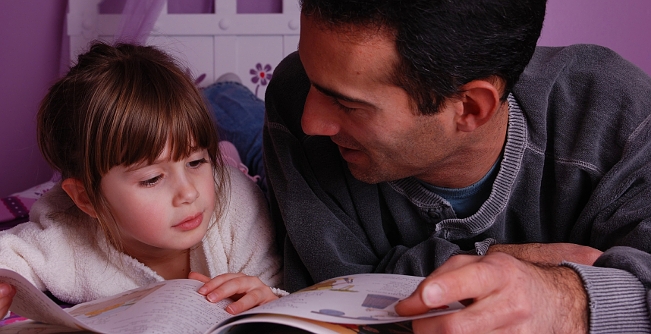Has reading lost its use in this day and age? With the advent of technology, it seems that more and more of our time is being spent immersed in virtual worlds comprised of digital screens, from phones to tablets or when we get home, our laptops.
Maybe this is an inevitable by-product of the Age of Information, where our needs have to be instantly met and, as a result, we do not have the time to read ourselves, let alone to our children. Maybe the time to let stories unfold in our collective minds and imaginations has passed?
New study shows fewer and fewer younger parents are reading to their kids
Booktrust, an organisation involved with further spreading the joys of reading, recently carried out a survey which provided us with some disappointing facts. It shows that young parents have not been reading to their children, with only 28% of young parents aged 16-24 claiming that this was their favourite time of the day, as opposed to 42 percent among over-55s. While only 19% of young parents claimed that they at least enjoyed reading to their kids, this was in stark contrast to 78% of older parents. So has the newest generation of parents lost touch with what’s important for their kids?
Harry De Quetteville of The Telegraph seems to agree. In a scathing report, he calls dads who don’t read to their kids “idiots”, saying that bedtime stories offer a sense of “bliss”, not just for the kids being read-to, but the parents involved. With most of their time spent at work or busy with chores and other errands, reading before bedtime provides a useful window for parents to connect with their children. He refers to this concentrated span of time as a “powerful moment of communion between father and child, a moment when a bond of learning and trust is build”, a point valid for mothers too.
Booktrust claims that reading to pre-school children gives them a 12-month head start by the time they’re in class. And science seems to be on their side. Research shows that reading to children has a myriad of benefits: creating a stronger relationship with the reader, heightening a child’s capacity for learning, reinforcing basic speech skills and communication skills, providing a better mastery of language, making them open to new experiences, and enhancing concentration and discipline – the ‘pros’ column seems to be endless. So why aren’t new parents getting involved in something so fundamental to their child’s growth?
Theories are numerous, but one contender is that these parents are not readers themselves, and did not grow up being read-to. Does that mean non-reading parents are doomed to repeat their parents’ mistakes? Perhaps not. A more potent threat, which has been covered before, is technology. Jordan Shapiro of Forbes magazine, claims that this is the continuation of the battle between old and new. He makes the connection that even though we live in an age where reading is everywhere, be it on Facebook or Twitter or through our e-mails; the content leaves a lot to be desired; but no-one is reading books either, which suggests that technology, really, has nothing to do with good habits.
A reading revolution
In fact, technological advances have actually increased our access to books. What once we needed to hunt down at book stores can now instantly be accessed at the click of a button. There might be some nostalgic romantics who are against the idea of anything other than paper books, but electronic media has made it immeasurably easier to store and read books.
In a study carried out by the Joan Ganz Cooney Centre, they found that “a majority of children ages 2 to 10 have access to a device for electronic have access to a device for electronic reading” with 49% of these engaging in some form of electronic reading either by themselves or with their parents. What matters more is the actual reading of books, not how children read them. Or anyone else for that matter.
Instead of seeing technology as the end of reading, it heralds a completely new beginning. With various platforms such as e-readers on phones, and child-specific tablets, reading to your children is a far less space-consuming activity – and a far cheaper one as well. With the copyright limitations of most classical literature running out, databases such as Project Gutenberg offer thousands of titles for free to anyone with a computer and an internet connection.
Taking the best of both worlds could prove to be a healthy decision for both you and your children. It provides important quality time and increases your kids’ mental capacity and wealth from an early age. With it now being such an easy and almost effortless activity, one that parents should be enjoying, the question is not “Why read to my children?” but rather, “Why not?”








